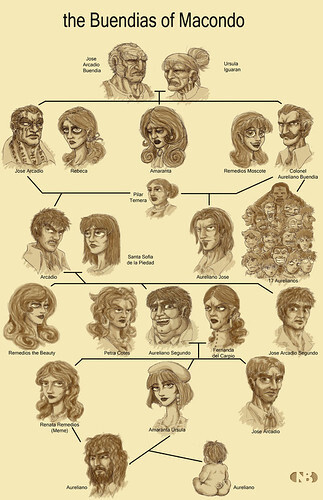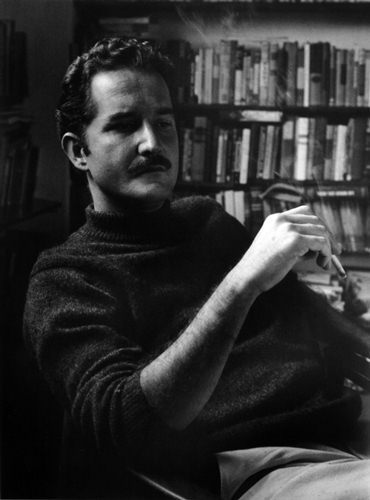What do you think?
Rate this book


417 pages, Mass Market Paperback
First published January 1, 1967


Remedios the Beauty was proclaimed queen. Úrsula, who shuddered at the disquieting beauty of her great-granddaughter, could not prevent the choice. Until then she had succeeded in keeping her off the streets unless it was to go to mass with Amaranta, but she made her cover her face with a black shawl. The most impious men, those who would disguise themselves as priests to say sacrilegious masses in Catarino’s store, would go to church with an aim to see, if only for an instant, the face of Remedios the Beauty, whose legendary good looks were spoken of with alarming excitement throughout the swamp. It was a long time before they were able to do so, and it would have been better for them if they never had, because most of them never recovered their peaceful habits of sleep. The man who made it possible, a foreigner, lost his serenity forever, became involved in the sloughs of abjection and misery, and years later was cut to pieces by a train after he had fallen asleep on the tracks. From the moment he was seen in the church, wearing a green velvet suit and an embroidered vest, no one doubted that he came from far away, perhaps from some distant city outside of the country, attracted by the magical fascination of Remedios the Beauty. He was so handsome, so elegant and dignified, with such presence, that Pietro Crespi would have been a mere fop beside him, and many women whispered with spiteful smiles that he was the one who really should have worn the shawl. He did not speak to anyone in Macondo. He appeared at dawn on Sunday like a prince in a fairy tale, riding a horse with silver stirrups and a velvet blanket, and he left town after mass.
لأنه مقدراً لمدينة السراب أن تذورها الرياح وتُنفى من ذاكرة البشر
في اللحظة التي ينتهي فيها أورليانو بوينديا من حلّ رموز الرقاق
وأن كل ما هو مكتوب فيها لا يمكن أن يتكرر منذ الأزل إلى الأبد
لأن السلالات المحكومة بمئة عام من العزلة ، ليست لها فرصة أخرى على الأرض
آمارنتا تضع يدها في في جمر الموقد إلى أن تألمت إلى حد لم تعد تشعر معه بالألم
ليبقى لحمها المحروق وضمادة الشاش السوداء في ذهني طوال الرواية يطاردني
*
*
لحظة إطلاق النار على ماوريسيو بابيلونيا وكأنني أنا التي أنهار في غرفة نوم ميمي
*
*
ولحظة اكتشاف آخر أورليانو من السلالة الوليد يتحول لجلد منفوخ بعد التهام النمل الأحمر إياه

وهذا السطر من الأم هو أول ما بث فيّ قشعريرة غير متوقعة بعد ربع الرواية، وأخترته لأبدأ به حكايتي مع تلك المدينة التي ابتدعها جابريل جارسيا ماركيز -رحمه الله- في عزلة من الزمن





والحقيقة أنه ظل مستغرقا في أفكاره، مذهولا من الطريقة التي شاخت بها القرية خلال سنوات قليلة، كانت أوراق أشجار اللوز بالية. والبيوت المطلية باللون الأزرق، ثم بالأحمر، والتي أعيد طلاؤها بالأزرق ثانية، فقد انتهت إلي لون غير محدود
ما الذي كنت تنتظره؟- تنهدت أورسولا، وأضافت :- إن الــزمـــن يـمـضـي
-وهو كذلك -وافقها أوريليانو -، ولكن ليس إلي هذا الحد
وهكذا، فإن المقابلة المنتظرة منذ وقت طويل، والتي أعد لها كل منهما الأسئلة، بل وتوقع الأجوبة عنها، تحولت إلي حديث يومي عادي

خرج خوسيه آركاديو الثاني من الغفلة وتخلي عن موقعه كرئيس فريق عمل في شركة الموز ووقف إلي جانب العمال. وسرعان ما اتهم بأنه عميل لإحدي المؤامرات العالمية ضد النظام
حرك رأسه بإتجاه الباب، وحاول الأبتسام، وكرر دون معرفه مسبقة، جملة قديمة لأورسولا، إذ قال مدمدما
-ماذا تريدين، فالزمن يمضي
-صحيح - قالت أورسولا- ولكن ليس إلي هذا الحد
وما أن قالت ذلك حتي أنتبهت إلي أنها تقدم الجواب نفسه الذي تلقته من الكولونيل أوريليانو بوينديا في زنزانته، وأحست بالقشعريرة وهي تتأكد مجددا من أن الزمن لا يمضي وإنما يلتف دائريا
"السنون الآن لا تأتي مثل السنوات من قبل"
اعتادت ان تقول ذلك، شاعرة بأن الواقع اليومي يفلت من بين يديها. فمن قبل -فكرت- كان الأطفال يتأخرون طويلا في النمو. وليس عليها إلا أن تتذكر كل الزمن الذي أنقضي قبل أن يذهب أبنها البكر خوسيه أركاديو مع الغجر، وكل ماجري قبل أن يعود ملونا كحية، ومتحدثا مثل فلكي ; والأشياء التي حدثت في البيت قبل أن ينسي آركاديو وآمارانتا لغة الهنود، ويتعلما القشتالية. ولا بد من رؤية أيام الشمس والصحو التي تحملها خوسيه أركاديو المسكين، تحت شجرة الكستناء، وكم كان عليها أن تبكي موته، قبل أن يحملوا إليها كولونيلا يحتضر اسمه آوريليانو بوينديا لتجد أنه بعد كثير من الحروب، وبعد كل ما عانته من أجله، لم يبلغ الخمسين من عمره بعد
ففي زمن آخر، وبعد أن تمضي النهار بطوله في صنع حيوانات من السكر، كانت تجد فائضا من الوقت للعناية بالأطفال. أما الآن بالمقابل، عندما لم يعد لديها شئ تفعله، تضطرها نوعية الزمن الردئ إلي ترك الأمور غير ناجزة بالكامل

حدثه الخمار عن نكبة ذراعه, فقد كانت متيبسة وشبه محروقة,لأنه رفعها علي أمه. وحدثه أوريليانو عن نكبة قلبه المتيبس وشبه المحروق, لأنه رفعه علي أخته
أبتعدي ايتها الابقار ..فالحياة قصيرة

أن الماضي ما هو إلا كذبة، وأنه ليس للذاكرة من دروب للعودة، وأن كل ربيع قديم لا يستعاد، وأن أشد الغراميات جموحا، وأكثرها رسوخا، ليست في نهاية المطاف إلا حقيقة زائلة
















Many years later, as he faced the firing squad, Colonel Aureliano Buendia was to remember that distant afternoon when his father took him to discover ice.
Jose Arcadio Buendia conversed with Prudencio Aguilar until the dawn. A few hours later, worn out by the vigil, he went into Aureliano’s workshop and asked him: “What day is today?” Aureliano told him that it was Tuesday. “I was thinking the same thing,” Jose Arcadio Buendia said, “but suddenly I realized that it’s still Monday, like yesterday. Look at the sky, look at the walls, look at the begonias. Today is Monday too.” On the next day, Wednesday, Jose Arcadio Buendia went back to the workshop. “This is a disaster,” he said. “Look at the air, listen to the buzzing of the sun, the same as yesterday and the day before. Today is Monday too.” That night Pietro Crespi found him on the porch, weeping for…his mother and father. On Thursday he appeared in the workshop again with the painful look of plowed ground. “The time machine has broken,” he almost sobbed,…he spent six months examining things, trying to find a difference from their appearance on the previous day in the hope of discovering in them some change that would reveal the passage of time.
Remember, old friend, I'm not shooting you. It's the revolution that's shooting you.
Tell me something, old friend: why are you fighting?"
What other reason could there be?" Colonel Gerineldo Marquez answered. "For the great Liberal party."
You're lucky because you know why," he answered. "As far as I'm concerned, I've come to realize only just now that I'm fighting because of pride."
That's bad," Colonel Gerineldo Marquez said.
Colonel Aureliano Buendia was amused at his alarm. "Naturally," he said. "But in any case, it's better than not knowing why you're fighting." He looked him in the eyes and added with a smile:
Or fighting, like you, for something that doesn't have any meaning for anyone.”